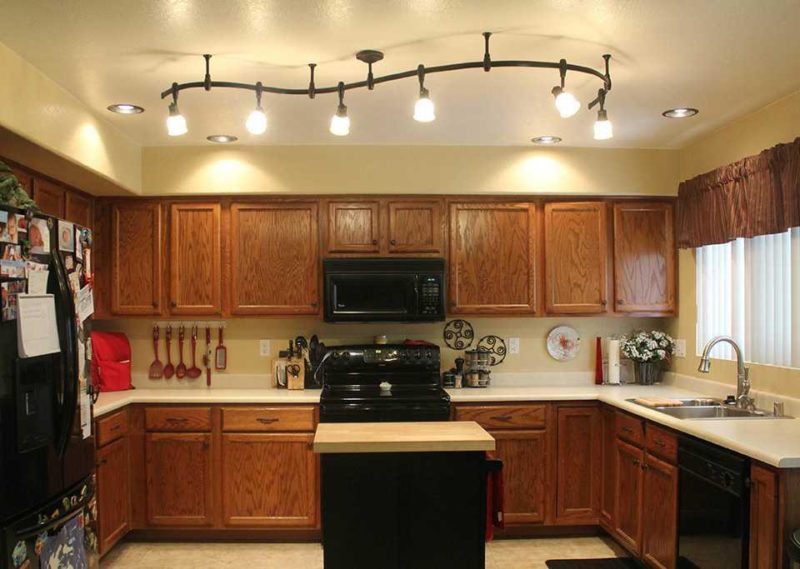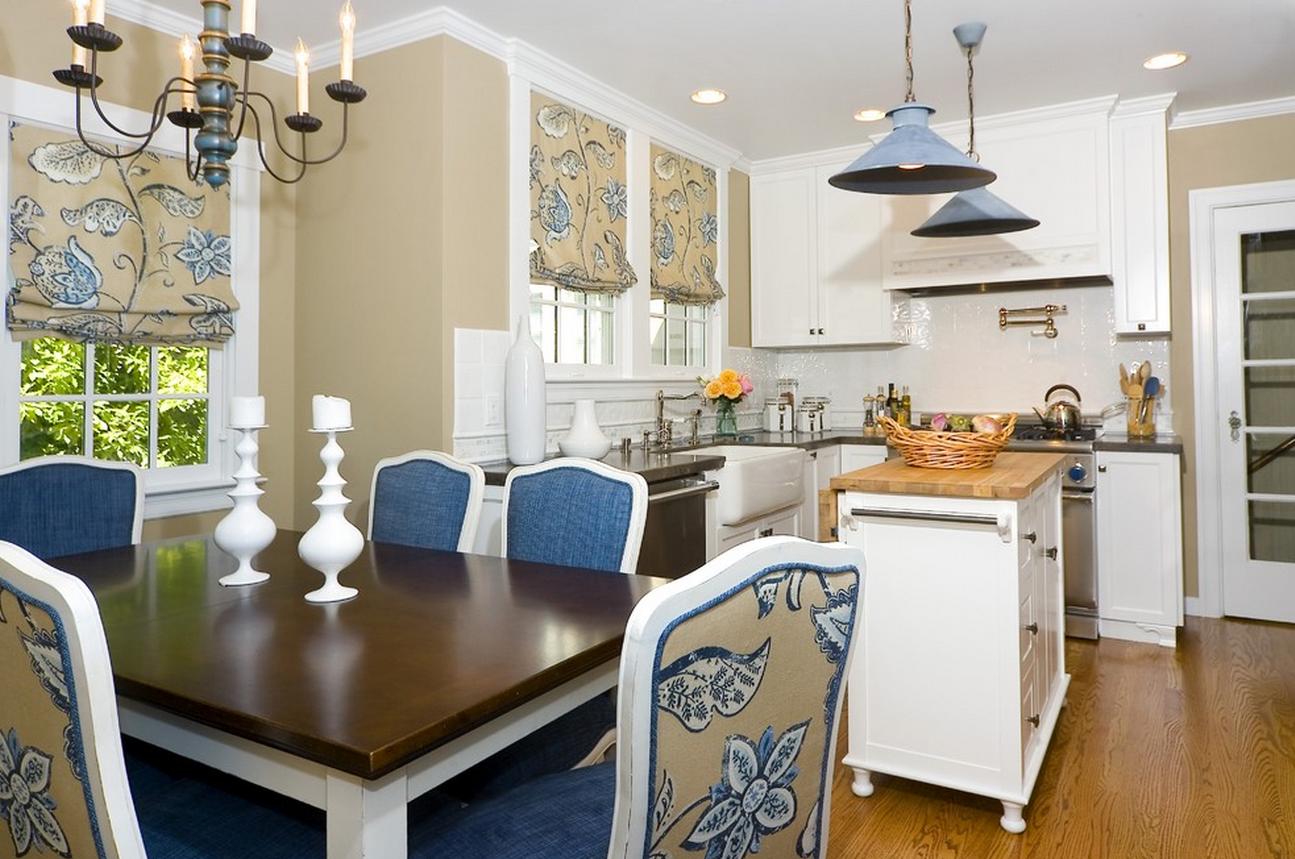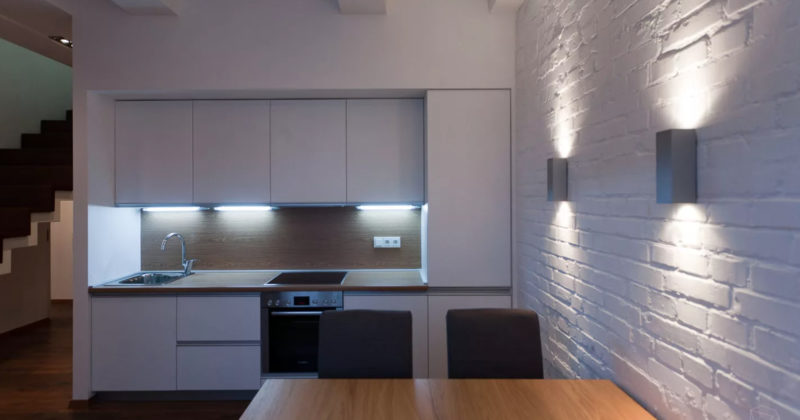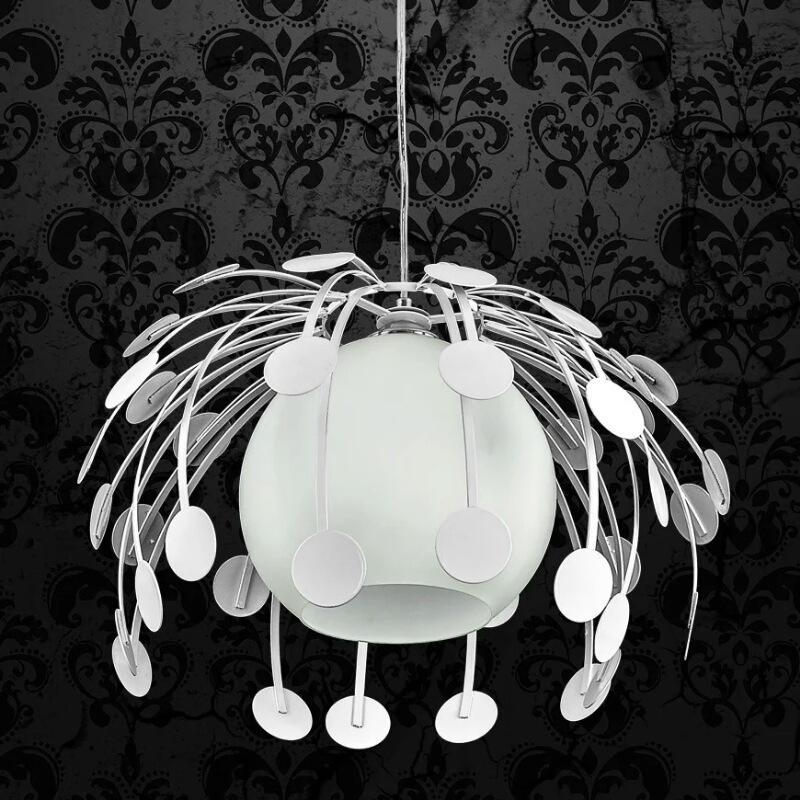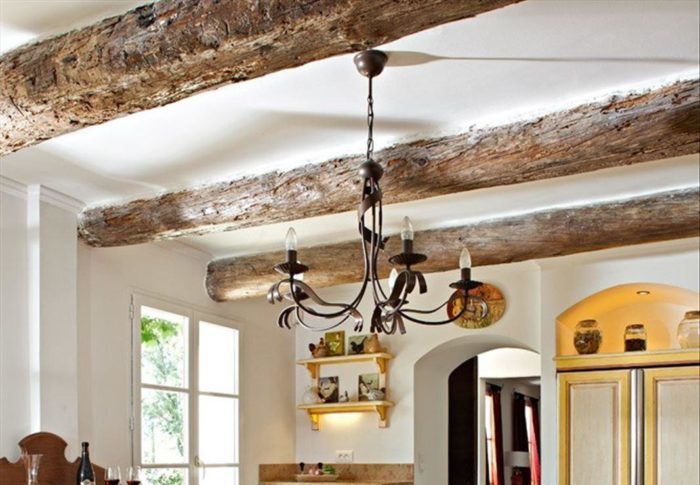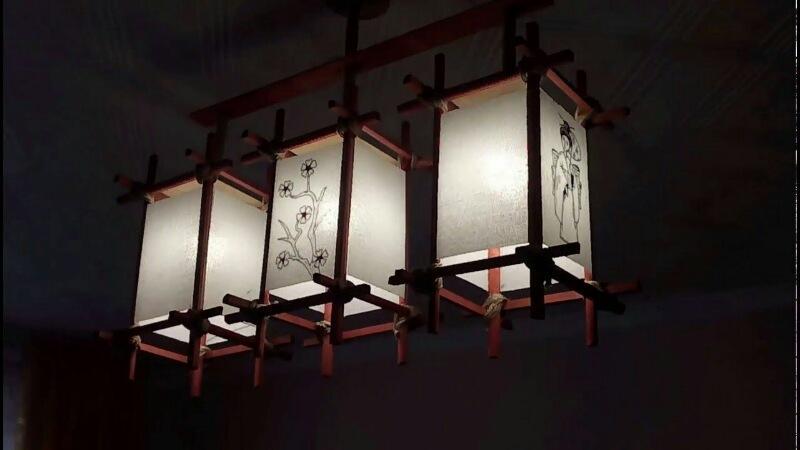Features of choosing a chandelier for kitchen lighting
To choose a chandelier in the kitchen, you need to consider a number of functional and visual points. The article introduces the basic criteria for selecting lighting fixtures for the kitchen, offers interesting solutions, talks about the rules of lamp placement and highlighting rooms with different designs.
The nuances of choosing a chandelier in the kitchen
To choose a chandelier for installation in the kitchen, you need to start from 5 key parameters:
- the height of the room;
- type of ceiling and mounting method;
- diameter of the lamp;
- location location;
- kitchen design style.
Now more about the influence of the first 3 parameters. The other 2 will be touched upon later.
Room height
Important! A principle that should be remembered as an immutable truth: the height of the kitchen lamp should not exceed a quarter of the entire height from floor to ceiling. That is, in a room with a ceiling of 2.80 m, you can install a chandelier height of up to 70 cm. The "height" of the chandelier refers to the distance between the extreme points at the top and bottom.
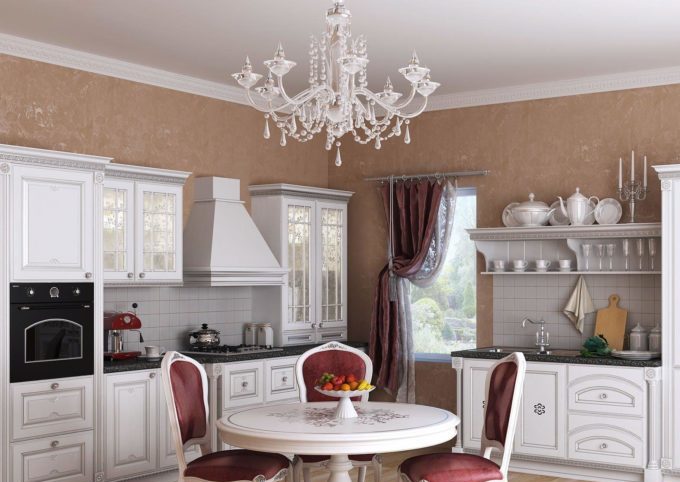
Ceiling type and mounting method
Depending on the type of ceiling in the room choose the appropriate mounting method. There are a total of four such options:
- hook;
- bracket;
- crossbar;
- I-beam platform.
To hang on a hook, you need models of lights that have a hook for it. In fact, this is the only way to mount in a stretch or suspended ceiling. The hook itself is attached to the concrete ceiling and is not visible under the stretch ceiling.
Brackets and cross bars are usually used with concrete surfaces, and I-beam platforms are needed to attach very large and heavy chandeliers, which are almost never put in kitchens.
Recommended for viewing: Creative chandeliers for the kitchen.
Diameter of the chandelier
There is also an important relationship between the size of the kitchen and the diameter (width) of the lamp. This parameter should not exceed 1/3 of the total width of the ceiling, not taking into account the part that is occupied by built-in furniture. If the kitchen ceiling is not square, but rectangular, focus on the short side. For example, a chandelier up to a meter wide can be placed in a kitchen with all walls 3 meters long.
Modern types of chandeliers for lighting the kitchen
In the design of chandeliers for the kitchen there are no restrictions on the part of the imagination. The main thing is that they fit all the parameters of the room and match its design. These are the main criteria on which to choose. Type, material, shape - already on your taste. It is necessary to take into account several points:
- Instead of the standard round shape, an elongated shape will be more advantageous. In it the lamps are placed along one line, which allows you to illuminate a large area.Elongated in length chandelier.
- Even more problems will solve the chandelier with two groups of lamps on a stand-alone switch, directed down and up. The lower light will be responsible for local lighting, the upper one for general lighting.
Material
The material from which the lampshade is made is also important. For example, a paper or textile lampshade is not the best solution. It is not so much dangerous (although not without it), as impractical. Such a lampshade gets dirty quickly, especially if the stove is not far away. Grease stains, soot, traces of fumes - all this spoils the appearance of the chandelier. Exposure to steam and moisture is what you need to protect your kitchen chandelier from in the first place.
The main materials for kitchen chandeliers are crystal, glass and plastic. New unconventional ideas are constantly being developed. So, for 2021 have popular kitchen chandeliers on energy-saving lamps. They give a small light, almost like a floor lamp in the bedroom, but here is important the material of the body. Wooden veneer, concrete, even silkworm cocoons or stork nests: this is no joke.
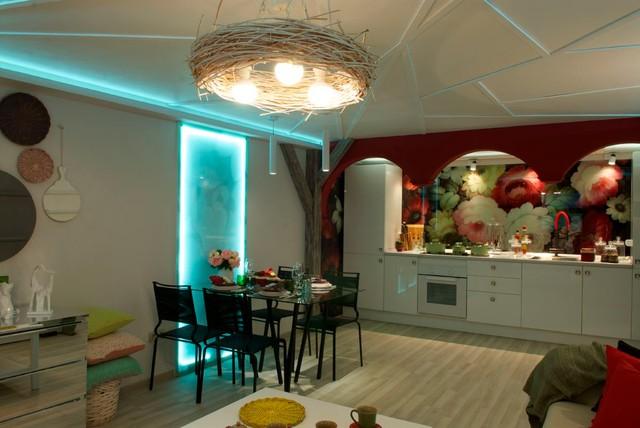
Color
The color of the lampshade is also important. It creates the mood of the kitchen. Briefly about the main colors of light fixtures:
- White - a classic that suits any design. It looks especially good on a white ceiling.
- Black - this color of kitchen chandeliers is rarely used and fits few places.
- Red, pink - these colors always attract more attention. This chandelier should not be "a lot".
- Blue, blue - the shades are not only universal for different designs, but also trendy, modern.Blue fixtures are beautifully complemented by chairs of the same color.
- Green, lettuce - fixtures in these colors add freshness to any kitchen.
- Yellow, orange - bright tones add a sense of summer and joy.
Best placement
In general, there are only two areas for installing a light fixture in the kitchen:
- Above the table;
- In the geometric center of the room.
More often resort to the first option. The table is a permanent gathering place for the whole family, dinners with guests. Therefore, it is logical that it should be well lit. On the other hand, to dazzle the light from the chandelier, of course, should not. Here it is worth to adhere to one principle.
The condition. You should always put the lamps less than the maximum power allowed for the luminaire. That is, if the instructions say that the maximum can be 60 watts, you can safely put "forty". If there is not enough light, the main chandelier can be strengthened with the help of sconces, recessed spotlights, additional lighting.
The minimum distance from the bottom of the lamp to the table should be at least 1.20 m.
But in the kitchen of a small area it would be appropriate to hang the chandelier in the geometric center. Then you won't need any extra light either. Each zone will get good lighting.
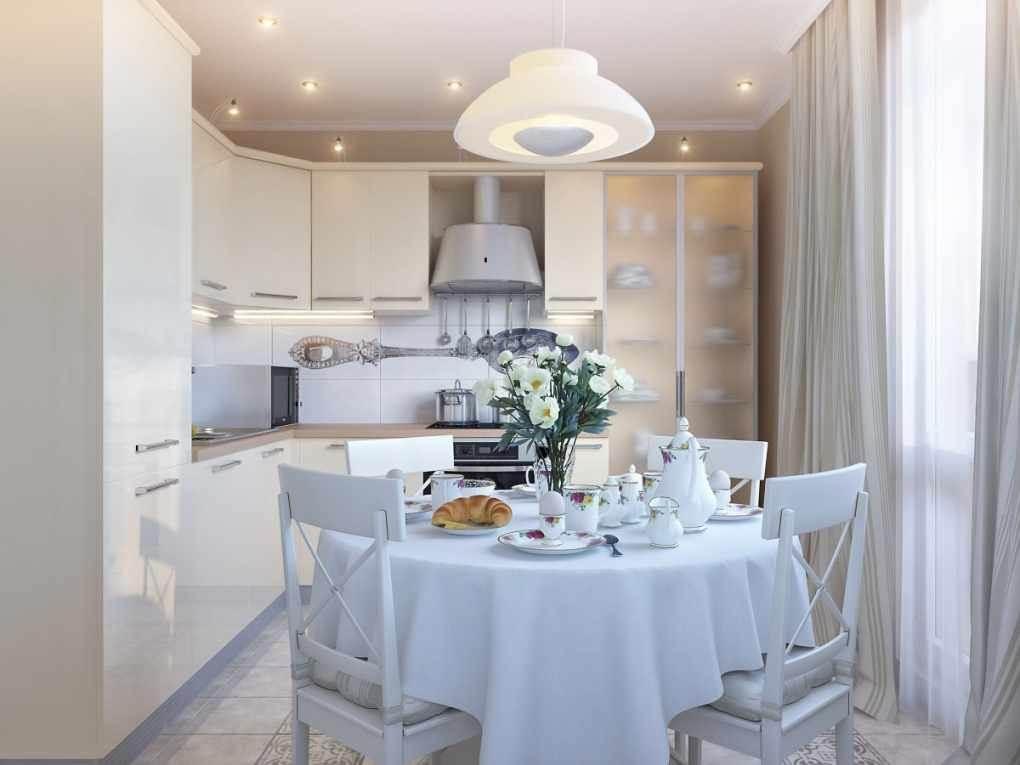
If the kitchen is very large and it has a bar counter, there is another way of placement. One chandelier is installed over the dining table, the other over the counter. This way the light balance between the different areas of the kitchen will be achieved.
Principles of lighting a combined kitchen-living room
Now many people combine the kitchen with the living room. This saves space and increases the usable area. A number of useful tips on the choice of fixtures and lighting such rooms - further in the text.
- Depending on the size and shape of the kitchen, one chandelier in the center or several, evenly scattered along the ceiling, may be responsible for the main lighting.
- For additional light, sconces and/or LED strip lighting.
- It is important to observe zoning. For example, the place for cooking should be accented with brighter light than the area for relaxing or tea drinking. But nothing should be left completely darkened.Decorative lights on the wall create comfort and at the same time illuminate the dining table.
- It is better to put more light sources, but with less power. So there is no glare, which is very important for the kitchen-living room.
- With the help of lighting you can change the visual perception of the room. Several lamps along one longitudinal line "lengthen" it, across - give the features of a "square". If the light falls on the walls, the kitchen, on the contrary, "sinks" lower.
- Separating the kitchen from the living room will help zoning light. The living room hangs a large chandelier, and near the chairs and sofa put a floor lamp. Above the table is also set a large lamp, and the remaining areas can be equipped with spotlights.
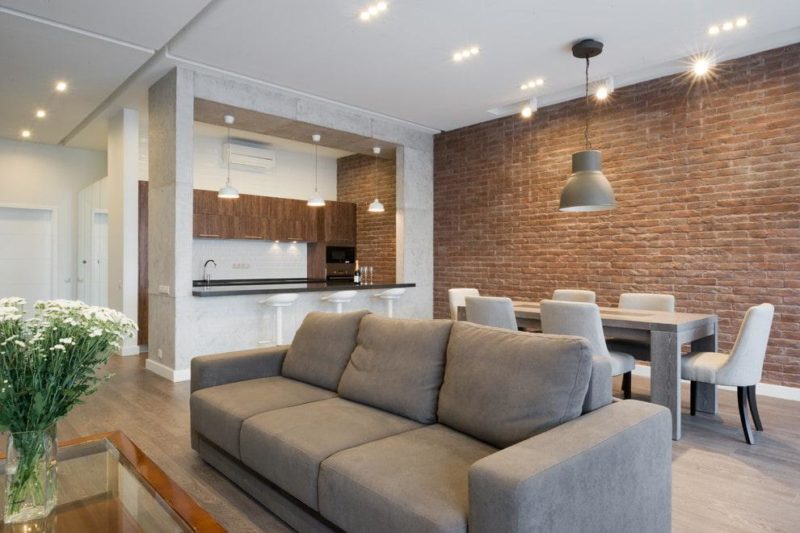
In general, the light in the kitchen should be noticeably brighter than in the living room with its quiet lighting.
Choosing a light fixture for different styles of kitchen interior
In conclusion - interesting options for chandeliers For the kitchen in different interior styles. Basically, you should be guided by the color and shape of the kitchen set. And, of course, the correspondence to the overall design should be.
- Classic style. Here, a chandelier with fabric plafonds or chandeliers with crystal or glass pendants will work well. Fixture in the kitchen in the classic design should be installed over the dining table.
- Modern. For such a room and need a light fixture to match. Usually these are modern chandeliers of non-standard shapes: spherical, cylindrical, in the form of a cube. Often unique author's models are made to order for modern kitchens.Example of Art Nouveau style.
- Country, Provence, Italy. For these interior styles are best suited large wrought iron chandelier with candlestick lamps or counterparts.A typical chandelier for the kitchen is
- Japan. Kitchens in the Asian style involve the use of special ethno-chandeliers. They are made of wood, colored glass. The lampshade is sometimes made of rice paper. The lamp should not violate the authenticity of the design "under Japan".Japanese stylistics.
- Eclectic and fusion.. In these styles, everything is mixed, and that's what they are famous for. Here the main thing is not to go too much. A good option is a crystal lamp. It will look restrained, but at the same time original.
